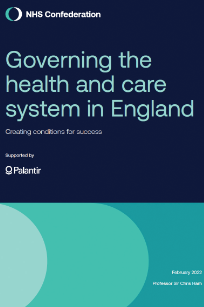News / Increasing focus on place as systems move towards formal start
 In the report – Governing the health and care system in England – Chris Ham (pictured), King’s Fund senior visiting fellow and former ICS chair, looked at how the central scrutiny of NHS performance can be reconciled with devolved decision-making.
In the report – Governing the health and care system in England – Chris Ham (pictured), King’s Fund senior visiting fellow and former ICS chair, looked at how the central scrutiny of NHS performance can be reconciled with devolved decision-making.
He said that ICSs would need to rapidly develop new capabilities and the authorising environment that systems work in must change.
He argued that ICSs should be held to account for a small number of national priorities, but should also agree a small number of local priorities as part of a memorandum of understanding with regional offices. Both the national and local priorities should be expressed as ‘whole system targets’. He called for the drawbacks of the current system – where wide-ranging targets are issued supported by copious amounts of guidance – to be recognised.
‘Funding should be allocated to ICSs on a population basis and not tied to specific deliverables,’ he said. ‘In turn, ICSs should devolve funding to place-based partnerships with resources only being retained by the system when agreed by partners.’
These measures would allow those responsible for delivering care to decide how best to use resources to improve outcomes and also eliminate the work involved in bidding for funding.
Decisions should be taken as locally as possible, he added, starting in teams and neighbourhoods, followed by places, system and the centre. And a ‘regime of proportionate accountability’ should be based on light-touch oversight of well-performing systems and rules-based intervention and support of other systems.
The government’s February white paper on integration of health and social care – Joining up care for people, places and populations – also set out a clear direction of travel towards greater accountability at place level. All systems are expected to have governance arrangements for places set up by spring 2023. This will include having a single person responsible for delivering outcomes.
While places will be free to decide on an accountability model that works for them, the Department of Health and Social Care has outlined a place board model as one way of taking local decision-making forward.
 Under this arrangement, the relevant local authority and the integrated care board (ICB) would delegate functions and budgets to the board. The paper also makes it clear the use of pooled or aligned budgets is expected to grow ‘eventually covering much of funding for health and social care services at place level’. Revised guidance will be issued to simplify the creation of section 75 pooled budgets. And the better care fund, which is regarded as a success, will also play a role in supporting integration at place level.
Under this arrangement, the relevant local authority and the integrated care board (ICB) would delegate functions and budgets to the board. The paper also makes it clear the use of pooled or aligned budgets is expected to grow ‘eventually covering much of funding for health and social care services at place level’. Revised guidance will be issued to simplify the creation of section 75 pooled budgets. And the better care fund, which is regarded as a success, will also play a role in supporting integration at place level.
However, while there is support for the introduction of systems and the important role that will be played by place-based partnerships, there are concerns about the proposed system architecture and the increasing central direction over structures.
Some finance leaders suggest the white paper has added complications and layers of bureaucracy rather than helping integration. While 2021’s Integrated care systems: design framework promised flexibility for systems in governance and management arrangements to operate in a way that reflects local context, there are now growing signs of prescription.
There is an increasing focus on place. But some believe that the starting point should be deciding what can be done at system level and then asking if better value would be delivered by breaking it down to a more local level. The aims are to improve working between primary and secondary care and between health and social care, and to move towards prevention. And the focus should be on how providers organise themselves to achieve these aims.
The Health and Care Bill is currently at the report stage in the House of Lords and is expected to receive royal assent in time for implementation on 1 July, when the 42 new ICBs will be created. Allocations for new ICBs are being set on broadly the same basis as for clinical commissioning groups and will cover delegated commissioning functions.
Some ICBs will take on delegation for some primary care services in 2022/23, with all expecting to take these on in 2023/24.
Speaking at the Nuffield Trust summit at the beginning of March, the trust’s deputy director of research, Sarah Scobie, said there were lessons to learn from earlier integration policies across the UK. The trust published a report in December exploring the impact of earlier integration policies.
‘It was clear to us there has been an over-reliance on structural and organisational levers to drive integration and these are not enough on their own,’ Ms Scobie said.
‘A legal duty to collaborate doesn’t necessarily mean it will happen in practice,’ she added, identifying the different cultures of organisations and workforce issues as examples of other issues that need to be considered. ‘We also found limited evidence that integrating finances have led to cost savings or more efficiency.’
She warned that initiatives often started off identifying integration in general as being a good thing for patients. But over time, these often ended up focused on narrow financial measures – for example, reducing emergency admissions to cut acute care costs.
Related content
We are excited to bring you a fun packed Eastern Branch Conference in 2025 over three days.
HFMA members, associates and friends come together again for the biggest and most prestigious HFMA event of the NHS finance calendar.